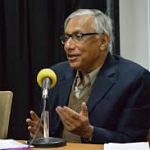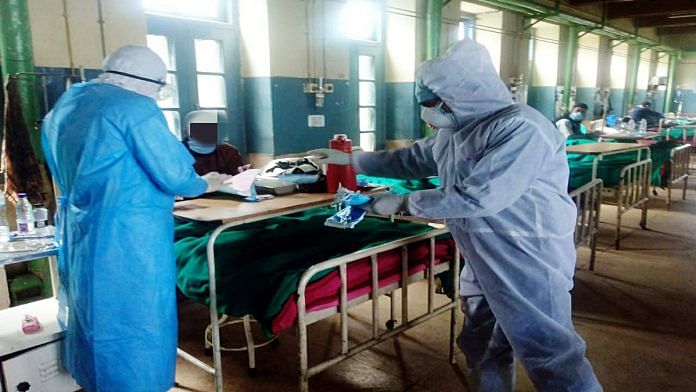 Policy support for Covid-19 crisis must be determined by extent of economic damage
Policy support for Covid-19 crisis must be determined by extent of economic damage
Jahangir Aziz | Chief Emerging Markets Economist, J.P. Morgan
Indian Express
Aziz argues that the “scope and size of policy support to address [the] coronavirus crisis need to be determined by extent of economic damage, not perceived limits about what India can afford.” Acknowledging the speed at which the virus spreads and the consequential uncertainty it has caused, Aziz notes that while the national lockdown, income and credit support are important measures, more needs to be done. He suggests an “extensive income support through existing government Jan Dhan and Mudra accounts to households and SMEs, temporary tax cuts or deferments to the larger corporates” and “substantial cuts in indirect taxes (GST) when social distancing is relaxed.”
 The return of the expert
The return of the expert
Rajeev Bhargava | Professor, Centre for the Study of Developing Societies, Delhi
The Hindu
Bhargava comments on the “return of facts, truth and experts” as the “unintended benefit of the pandemic”. With the uncertainty around coronavirus and little information available, he states that experts have made a comeback in public discourse. Defining an expert as someone who has “special skills and virtues, with legitimate authority in their own field and the stature to advise and teach their skills,” Bhargava explains that experts should not be confined to medical doctors and researched but in fact should be extended to “expert historians, social scientists and socially grounded intellectuals — all badly needed to check the mayhem that has followed the announcement of the lockdown and its dreadful impact on migrant workers.”

 Covid-19: Centre and states must work together
Covid-19: Centre and states must work together
Yamini Aiyar | President and chief executive, Centre for Policy Research.
Mekhala Krishnamurthy | Senior fellow and director of the State Capacity Initiative, CPR, and associate professor, Ashoka University
Hindustan Times
Aiyar and Krishnamurthy argue that the Modi government’s decision to initiate a lockdown sheds light on “an approach focused on controlling people, rather than developing systems, to control the spread of the virus”. Urging the government to “move away from command-and-control to coordination and genuine Centre-state collaboration,” the two argue, “Cooperative federalism is imperative in this coronavirus war.” Aiyar and Krishnamurthy suggest that “Centre’s relief package (the Pradhan Mantri Garib Kalyan Yojna) ought to be redesigned and enhanced as a block grant to states”, and an ease in “financial management and procurement” to ensure states have full control over actual transaction of Personal Protective Equipment, is required.
 Print warriors on the corona frontlines: Why print media enjoys distinct advantages over purely web based content providers
Print warriors on the corona frontlines: Why print media enjoys distinct advantages over purely web based content providers
Sreeram Sundar Chaulia | Dean, Jindal School of International Affairs
The Times of India
Chaulia argues that print media is “proving to be gold” at a time when there is too much information available on coronavirus and it is difficult to separate fact from fiction. With plenty of damage being done to the distribution and sales of physical copies of newspapers, Chaulia highlights two distinct advantages that print media has — “Long pedigrees and solid reputations for fact checking, cautious and responsible dissemination” and “they give readers the analytical depth that fleeting and momentary snippets, ‘shares’ and ‘likes’ cannot deliver.” As opposed to the US and UK, Chaulia believes that “India [does] not have the perverse problem of what the American scholar Tom Nichols calls ‘anti-expertise and anti-intellectual sentiment’”.
 Covid-19 will topple our paradigm of economic value
Covid-19 will topple our paradigm of economic value
Kiran Mazumdar-Shaw | Chairperson and managing director, Biocon
Mint
Shaw comments on the economic impact of the coronavirus crisis and says, “It will lead to a re-examination of the current investment mantra of giving astronomical valuations to virtual companies that create intangible assets and provide aggregator services”, explains Shaw. She argues that “India not only needs to invest in expanding manufacturing scale, we also need to inject funds in our science- and technology-based companies”.
 Training Migrants in Lockdown
Training Migrants in Lockdown
Sukanta Chaudhuri | The writer is professor emeritus, Jadavpur University, Kolkata
The Economic Times
Chaudhuri also comments on the situation of migrant workers. “They have no money and no hope of earning any” and “they are worried about their families”, says Chaudhuri. He explains that “several states need to harvest the rabi crop, and are anxious about labour supply during lockdown” and this means many of the migrant workers will be travelling anyway. As people are moving anyway, they can be helped and monitored so they don’t take the virus with them. Chaudhuri argues that the Railways is best suited for this and “with a small on-board police team, a train can be effectively sealed off without any contact with the hinterland en route, obviating any infection or, indeed, confrontation with locals.”
 Economies after Covid-19
Economies after Covid-19
Dhiraj Nayyar | Chief economist, Vedanta
Business Standard
Nayyar compares the economic impact of the coronavirus crisis with that of the 2008 financial crisis. “Rebooting economies, which are basically reduced to functioning on life support of essential goods and services, will be a greater challenge than restarting the heart à la 2008″, explains Nayyar. He says the world was different then and the massive fiscal stimulus packages given then aren’t available now. He argues that the Union “government will need to adopt industrial policy, not in the traditional sense of picking winners, but in terms of providing big funding to high technology sectors”.
Today’s Editorials
Hindustan Times: The daily argues that while it is important to take action against the Tablighi Jamaat in the Nizamuddin incident, it’s also important to not communalise the issue. The trend to blame the entire Muslim community is unfortunate and should be resisted. India cannot afford deepening of the Hindu-Muslim divide at a time when every citizen is trying to confront a common enemy, it notes.
The Hindu: The organisers of the Tablighi Jamaat event in Nizamuddin should have been aware that a similar gathering in Malaysia in end-February had led to a spike in cases. That the Health Ministry did not consider coronavirus a health emergency till 13 March is no excuse. The lockdown period should be used for proper contact tracing, it writes.
The Indian Express: Express notes that the Supreme Court has rightly directed the media to report the official developments about the coronavirus pandemic, however, it is not the only version that exists. Fear and phone forwards are fertile ground for rumpus but the absence of credible communication and assurances from the government also contribute. If the press had only relied on the official version, the magnitude of the crisis wouldn’t have come to the light for the government to address, it argues.
With inputs from Unnati Sharma



